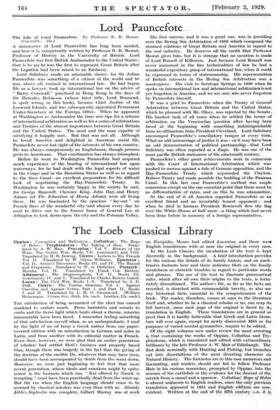Lord Pauncefote„
The Life of Lord Pauncefote. By Professor R. B. Mowat. ' (Constable. 16s..) A BIOGRAPHY of Lord Pauncefote has long been needed, and here it is, competently written by Professor R. B. Mowat, Professor of History in the University of Bristol. Lord Pauncefote was first British Ambassador to the United States ; that is to say he was the first to represent Great Britain after the Legation had been raised to an Embassy.
Lord Salisbury made an admirable choice, for Sir Julian Pauncefote was something of a citizen of the world and he was, above all, trained in international law. He had begun life as a lawyer, took up international law on the advice of " Barry Cornwall," practised in Hong Kong in the days of Sir Hercules Robison (whose later title, Lord Rosrnead, is spelt wrong in this book), became Chief Justice of the Leeward Islands, and was subsequently appointed Permanent Under-Secretary at the Foreign Office. When he appeared at Washington as Ambassador the time was ripe for a scheme of international arbitration as well as for a series of arbitrations and Treaties of the utmost importance between Great Britain and the United States. The need and the man capable of satisfying it happily met. But that was not all. Although he loved America and delighted in American social life, Pauncefote never lost:sight of the interests of his own country. He was always conspicuously an Englishman, though persona grata to Americans. That combination has always triumphed.
Before he went to Washington Pauncefote had acquired much experience of the bearing of international law upon waterways, for he had dealt with the legal aspects of water in the Congo and in the Danubian States as well as in regard to the Suez Canal—an excellent preparation for his difficult task of negotiating the Hay-Pauncefote Treaty. In Washington he was certainly happy in the society he met, for George Bancroft, Clarence King, John Hay, and Henry Adams (of The Education of Henry Adams) were all living there. He was fascinated by the spacious " lay-out " on French lines of the wonderful city 'and almost every day he used to drive out to the former home of General Lee at Arlington to look down upon the city and the Potomac Valley. His first success, and it was a great one, was in presiding over the Bering Sea Arbitration of 1893 which composed the strained relations of Grept Britain and America in regard to the seal industry. He deserves all the credit that Professor Mowat gives him, but it is strange that no mention is made of Lord Russell of Killowen. Just because Lord Russell was never immersed in the fine technicalities of law he had a wonderful expository grasp of international law, when it could be expressed in terms of statesmanship. His representation of British interests in the Bering Sea Arbitration was a masterpiece. His visit to Saratoga Springs in 1896 when he spoke on international law and international arbitration is not yet forgotten in America, and we are sure was never forgotten by Pauncefote
It was a grief to Pauncefote when the Treaty of General Arbitration between Great Britain and the United States, which he planned with Mr. Olney, was rejected by the Senate. His hardest task of all came when he settled the terms of arbitration on the Venezuelan question after having been faced at the beginning with something indistinguishable from an ultimatum from President Cleveland. Lord Salisbury encouraged Pauncefote's conciliatory temper at every turn. What an odd miscarriage of justice it was—or it may have been an odd demonstration of political partisanship that Lord Salisbury was often regarded as a Jingo. He was one of the most pacific British statesmen of the nineteenth century.
Pauncefote's other great achievements were in connexion with the Court of International Arbitration which was pushed to success against a tide of German opposition, and the Hay-Pauncefote Treaty which s.--perseded the Clayton.. Bulwer Treaty and made possible the building of the Panama Canal. In this last case Pauncefote's method was ample concession except on the one essential point that there must be no differentiatiOn of rates, and on this he was adamantine.
At the end of it all America regarded Pauncefote as an excellent friend and an invariably honest opponent ; and when he died in harness President Roosevelt flew the flag over the White House at half mast—a thing which had never been done before in memory of a foreign representative.








































 Previous page
Previous page